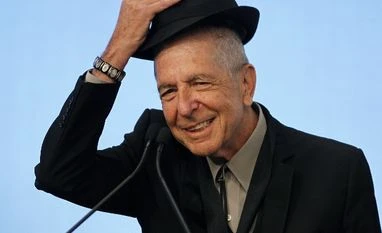When I met Leonard Cohen, I was a failed writer, and I acted like one. We were waiting to bow into the walking meditation line at the Rinzai-ji Zen Center in Los Angeles. I pretended I didn’t know who he was and asked him if my Ford Festiva was parked in the right place.
“Sure,” he said.
I feigned surprise: “‘Everybody Knows.’ I’d recognise that voice anywhere.”
His monk’s name, Jikan, means “noble silence,” and he manifested it then. I was mortified.
I gave up writing to become a Zen monk, and then, a decade after meeting Jikan, I wrote a book about being a monk. A helpful nun left chapters of the work-in-progress in his cabin during a retreat.
I was the head monk at the monastery, and I approached him at the end of a long day to ask how his back was. He was short, thin and old, but he still sat like a rock in the zendo meditation hall.
More From This Section
“I don’t feel a thing,” he said. I nodded: “Your meditation must be really strong.”
He shook his head and said, “OxyContin.”
He had a decades-long relationship with our teacher, the Roshi, and it was my privilege to witness these two powerful men “make relationship,” as Roshi would say.
I think Roshi liked having Jikan around because Jikan did not make any demands on him. They could just sip tea in silence. One afternoon, Roshi, 106 years old by then, diminished by both age and a sex scandal that devastated our community and his reputation, had an accident in his adult diapers. As I took Roshi to the bathroom, Jikan filled a basin with warm water, removed his suit coat and cuff links, and rolled up his crisp white sleeves.
“Jikan, I can do that part,” I said.
“I wouldn’t think of it,” he said.
I helped Roshi stand while Jikan knelt behind him and gently wiped him clean.
Watching Jikan serve our teacher, unobsequiously and with intelligence, care and respect, helped take the sting out of my own failures as a writer and as a man. You learn that there is something greater than artistic success when you see a great artist humbling himself.
He and Roshi had a similar project, a shared vision: Roshi taught it, Leonard sang it. With none of Leonard’s eloquence or Roshi’s wisdom at my disposal, I would describe it as the union of contrary things — and then their separation again, and the struggle in between.
The penultimate time I saw Jikan, I was getting lunch on Larchmont Street with an old friend from my Hollywood screenwriting days. I had given him a copy of my book. Only one thing about it impressed him: “Dude, I can’t believe you know Leonard Cohen!”
We left the pizza parlour, turned the corner, and who should be sitting at a table outside a burger restaurant but Jikan Leonard Cohen himself. He had an office nearby, and we spent the afternoon brainstorming about how to revitalise the monastery now that our teacher was dead.
“What if you put in a rifle range and get a bunch of young guys up there?” Jikan said. “Man, if I were 15 minutes younger, I’d join you.”
Yes, rifles. For all the self-satisfied liberals who want to claim him as one of their own, I’m sorry, but Leonard Cohen belongs to everyone. Once, when we were waiting in the lobby at the doctor’s office, he said: “My National Rifle Association hat came in the mail today. I looked at the tag. I couldn’t believe it: Made in China!”
After I rearranged my jaw on my face from its descent to the floor, I said, “You’re an N.R.A. member?”
He kept starting straight ahead. “Let’s keep that between us,” he said.
The last time I saw him, he looked epiphanic and light, as if he were disappearing. He told me that during his stay in India after his years at our Zen monastery, something clicked and he found a peace inside that had never left him.
He played his new album for me. At the end, gorgeous, soft strings set the tone, lulling you into a drifting, pensive melancholy. Then his voice emerges with the wish for a treaty of love. He sat in silence before me, this aged, tiny, impeccably dressed poet, his black fedora tilted lightly on his head, his voice booming all around us.
I miss you, beloved brother monk and mentor. The world needs spiritual artists now more than ever. We need artists who are afraid of something other than their own failure, who bow down before something greater than likes, legacy and culture creation.
In a world filled with climbers, fakes and opportunists, from our street corners and churches all the way to Washington, D.C., you were the real deal. You alone could give voice to these dark times, but when I call your name there is only noble silence.
Shozan Jack Haubner is a Zen Buddhist priest
©2016 The New York Times
)